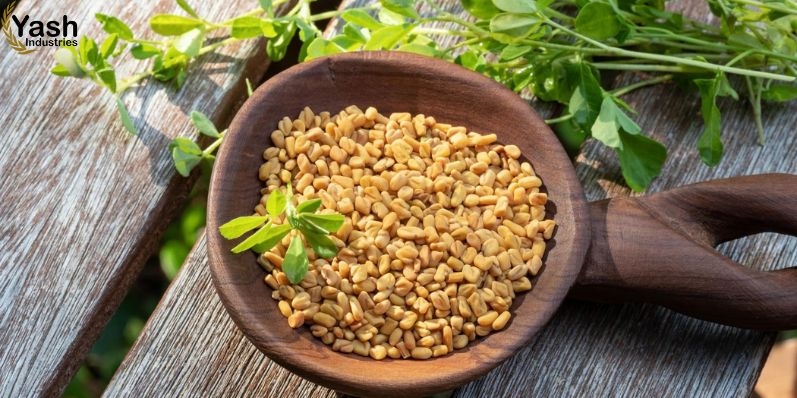
09-08-2024
Bringing Fenugreek Seeds to the Russian Table: Creative Uses in Traditional Dishes
- Admin
Fenugreek, an aromatic spice with a rich history in Indian and Middle Eastern cuisines, is finding its way into kitchens around the world. Known for its distinctive flavor, which combines a hint of bitterness with a subtle sweetness, fenugreek seeds are not a traditional ingredient in Russian cooking. However, their unique taste and health benefits make them a worthy addition to Russian dishes. In this blog, we’ll explore how fenugreek seeds can be creatively incorporated into traditional Russian recipes, adding a new dimension to beloved dishes.
Understanding Fenugreek Seeds
Fenugreek seeds come from the Trigonella foenum-graecum plant, native to the Mediterranean region and parts of Asia. The seeds are small, yellow-brown, and have a slightly bitter, nutty flavour that is reminiscent of maple syrup. Rich in fibre, vitamins, and minerals, fenugreek is known for its potential health benefits, including improved digestion, anti-inflammatory properties, and blood sugar regulation.
Fenugreek Seeds in Traditional Russian Dishes
1. Borscht with a Fenugreek Twist
Borscht, the iconic beet soup, is a staple in Russian cuisine, often enjoyed for its hearty, comforting qualities. Adding fenugreek seeds can provide a surprising twist to this classic dish.
• How to Use: Start by toasting a teaspoon of fenugreek seeds in a dry skillet until they release their aromatic oils. Grind them into a fine powder and add this to your borscht along with other seasonings. Incorporate it into the soup towards the end of cooking to allow the flavours to meld.
• Flavour Profile: The fenugreek will add a subtle depth and warmth to the borscht, complementing the earthy beets and tangy sour cream traditionally used in the dish. The maple-like undertones of fenugreek can enhance the soup’s complexity, making it even more comforting.
2. Fenugreek-Infused Russian Meatballs (Kotleti)
Russian meatballs, or kotleti, are known for their savoury and satisfying flavours. Adding fenugreek seeds can introduce a new layer of taste to these traditional favourites.
• How to Use: Incorporate a teaspoon of crushed fenugreek seeds into the ground meat mixture.Mix with onions, garlic, bread crumbs, and your choice of seasonings. Mix thoroughly and form into meatballs.
• Flavor Profile: The fenugreek will add a warm, slightly sweet note that pairs well with the savory meat. This unique flavor twist will make the kotleti stand out, providing a delightful surprise for the taste buds.
3. Savory Fenugreek Potatoes
Potatoes are a versatile ingredient in Russian cuisine, featured in many dishes from salads to side dishes.Fenugreek seeds can enhance the flavor of roasted or baked potatoes.
• How to Use: Toss diced potatoes with olive oil, salt, pepper, and a pinch of fenugreek seed powder before roasting. You can also add fenugreek seeds to potato salads for an interesting twist.
• Flavor Profile: The fenugreek adds a rich, slightly sweet, and nutty flavor to the potatoes, creating a harmonious blend with the natural sweetness of the potatoes and the crispiness from roasting.
4. Fenugreek-Enhanced Russian Sauerkraut
Sauerkraut is a traditional Russian side dish that pairs well with a variety of main courses. Fenugreek seeds can introduce a new dimension to this fermented favorite.
• How to Use: Add a teaspoon of fenugreek seeds to the sauerkraut mix before fermentation. The seeds will infuse the sauerkraut with a unique flavor, enhancing its tangy, fermented taste.
• Flavor Profile: Fenugreek’s subtle sweetness and complexity will complement the sourness of the sauerkraut, adding depth and making the sauerkraut more intriguing.
5. Fenugreek in Russian Pickles
Pickles are a popular accompaniment in Russian meals, and fenugreek seeds can offer a new flavor experience.
• How to Use: Include a few whole fenugreek seeds in the brine used for pickling cucumbers or other vegetables. The seeds will impart a mild, sweet, and slightly bitter flavor to the pickles.
• Flavor Profile: Fenugreek’s distinctive taste will blend with the tangy and spicy notes of pickles, creating a unique pickle that stands out from traditional recipes.
6. Fenugreek-Infused Russian Rye Bread
Rye bread is a cornerstone of Russian cuisine, celebrated for its rich flavor and hearty texture. Fenugreek seeds can give this traditional bread a unique twist.
• How to Use: Incorporate a teaspoon of fenugreek seeds into the rye bread dough. The seeds can be used whole or ground, depending on your preference.
• Flavor Profile: Fenugreek will introduce a sweet, nutty undertone to the rye bread, complementing the hearty flavors of the rye and making the bread more complex and aromatic.
Health Benefits and Nutritional Boost
Incorporating fenugreek seeds into Russian dishes not only adds a unique flavor but also offers several health benefits. Fenugreek seeds are high in fiber, which supports digestive health and can help regulate blood sugar levels. They are also rich in antioxidants, which can help mitigate inflammation and promote overall health.
Conclusion
Fenugreek seeds, with their distinctive flavor and numerous health benefits, provide an exciting opportunity to innovate traditional Russian dishes. From borscht to rye bread, these seeds can be used to enhance flavors and introduce new dimensions to classic recipes. Experimenting with fenugreek in your cooking can lead to delightful surprises and a fresh take on traditional Russian cuisine. Whether you’re a culinary adventurer or just looking to add a unique twist to familiar dishes, fenugreek seeds offer a wonderful way to enrich your culinary repertoire.